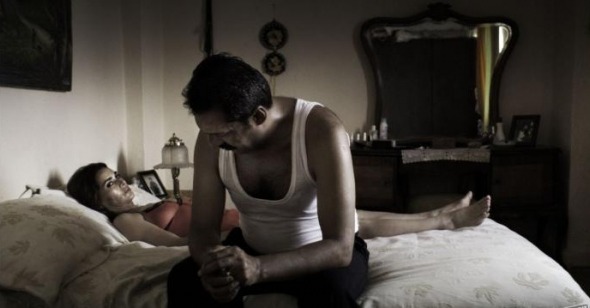Climate Control
by Jeff Reichert
Three Monkeys
Dir. Nuri Bilge Ceylan, Turkey, Zeitgeist
Itâs always dangerous to draw assumptions about other cultures based on what might generally be labelled âartisticâ as opposed to âpopularâ cultural output. Books and films loved by the literati are often shunned by the masses, and while folks like Nobel Prizeâwinning author Orhan Pamuk and film festival favorite Nuri Bilge Ceylan would seem to be exemplary and unique ambassadors of contemporary Turkish culture, their works paint a picture of Turkey and Turkish mores far different than the bits and snatches of the countryâs more lurid popular cinema Iâve had the opportunity to come across (i.e. Mustafa Altioklarâs tawdry box-office smash Istanbul Beneath My Wings). Films from Fatih Akin (The Edge of Heaven) and Ferzan Ozpatek (Steam: The Turkish Bath) complicate matters further in that both straddle binational identities and filmmaking (Italian for Ozpatek and German for Akin) and have accordingly found wider audiences here and in Europe by hewing more closely to the standard set by middle-of-the-road government funded Europudding.
Whether Ceylan speaks of or for Turkey is open for debate, but whatâs remarkable about his fifth feature, Three Monkeys, is how he stamps a fairly straightforward genre piece with the marks of his own artistry. That may well be all we can really ask for in a filmmaker, and Iâm happy to believe that, in his hazy, grey shots of the vast expanse of the Bosporus, heâs providing access to another world (or, in the case at hand, one that seems inextricably bound between two). My colleague Nick Pinkerton observed of Ceylan in a review of Climates: âCeylan is not Pialat, not Antonioni, and certainly no âmaster.â But he is a diligent artist who squints and picks and digs and waits for tonal specificities in scenes (aided by hyper-crisp foley sound), he has a fine eye for dolorous landscapes, and he has more of a sense of humor than you might expect.â Iâll agree with one reservation: if Three Monkeys is the first step on a path to broaden his reach beyond more personal, inward-looking concerns (the stuff of, as Ebert put it while describing Distant, âfashionably dead films, in which shots last forever, and grim middle-aged men with moustaches sit and look and think and smoke and think and look and sit and smoke and shout and drive around and smoke.â), then the Turkish auteur might just be due for a promotion.
Three Monkeys is noir, but with most plot touchstones stripped away in favor of wan considerations of the roiling emotions and interactions often ignored by narrative-hungry filmmakers. (It reminds a bit of Tarrâs similarly languorous take on the genre, The Man from London.) After Servet (cowriter Ercan Kesal), a prominent politician, leaves the scene of a vehicular manslaughter on the eve of national elections, he cuts a deal with his chauffeur EyĂŒp (Yavuz Bingöl), who will take the fall, and upon release from prison in a yearâs time, collect a tidy sum in payment. The hit-and-run itself is a lovely piece of filmmaking: a car drives off into the distance and disappears into the night, the screech of tires wafts onto the soundtrack, but quietly, and in the next composition, we see Servetâs vehicle parked in the extreme fore, with a lump occupying the middle of the frame and the road twisting off into the distance. We donât need to see the accident (which, according to the press notes, was apparently shot and left unused), and we also donât even see Servet making his offerâinstead Ceylan focuses on the predawn Bosporus shipping traffic.
Itâs clear from this start that Ceylanâs handling of images is highly specific, and throughout Three Monkeys we find a dogged insistence on continuous takes, a marvelous play with depth of field, judicious use of close-ups. His background as a photographer may be the cause, but his eye is never annoyingly precious. And as the remaining family members, son Ismail and wife Hacer, negotiate EyĂŒpâs absence, Ceylanâs focus on composition and his pleasantly lethargic storytelling offers a welcome antidote to the ADD stuff that passes for âgenre investigationâ of late. After Ismail arrives home unexpectedly to find his mother in bed with Servet, tensions reach a slow, hot simmer that comes close to exploding when EyĂŒp returns from prison and realizes the same (Ceylan neatly skips through time easily compacting the near year of his narrative). In a sequence fraught with tension and the threat of violence, sex, or both, the grizzled chauffeur sits atop his wife in bed, tossing her around, undressing her, caressing her. Itâs hard to tell what his intentions areâit seems almost as though he doesnât know either. Hacerâs reaction is similarly complex: desire morphs into laughter, and then fear and sadness. Sex here is not something that need be completed for the sake of narrative checklists, but a fertile ground for complicated primal conflict.
I had the good fortune to catch a screening of Ceylanâs first film, The Small Town (or The Village), back in the late Nineties. Completely out of any context, this black-and-white documentary about his small hometown left an indelible stamp, and Iâve long wondered about the film and filmmaker in the years since and was wholly convinced Iâd never see or hear anything about them again. Even though I havenât seen any of Ceylanâs intervening three features (Clouds of May, Distant, Climates), Three Monkeys brought me back to The Small Town, and after a little bit of searching, I was excited to discover that they were the work of the same filmmaker. Perhaps thatâs one of the best reasons of all to spend time with Three Monkeys. For those who care about things like oeuvres and artistic evolution, hereâs the proof, as itâs happening.
